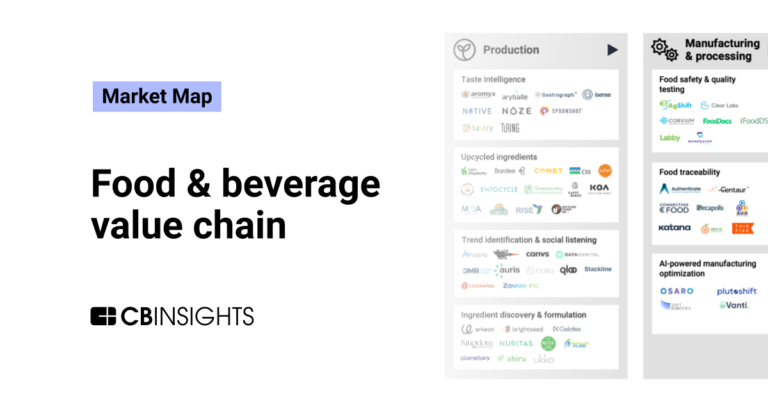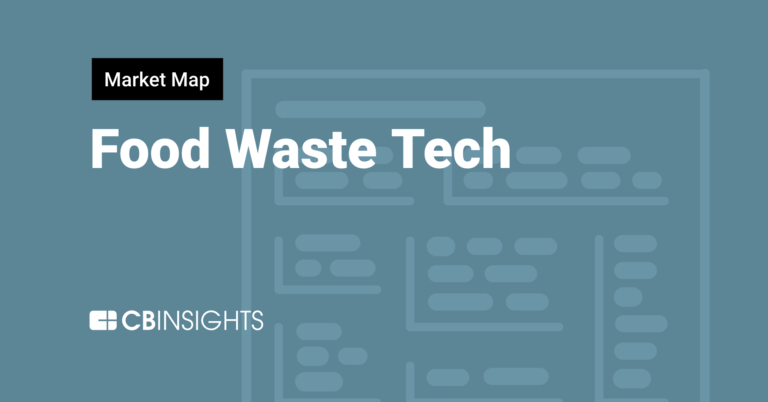
Misfits Market
Founded Year
2018Stage
Series C - II | AliveTotal Raised
$526.5MValuation
$0000Last Raised
$225M | 4 yrs agoAbout Misfits Market
Misfits Market provides various food options, including organic produce, meats, dairy, and pantry staples, aimed at reducing food waste and supporting a less wasteful food system. Misfits Market serves consumers looking for grocery delivery services. It was founded in 2018 and is based in Clackamas, Oregon.
Loading...
ESPs containing Misfits Market
The ESP matrix leverages data and analyst insight to identify and rank leading companies in a given technology landscape.
The surplus food marketplaces market connects restaurants, retailers, and growers with buyers to sell excess food and produce at discounted prices, reducing food waste while generating additional revenue. Companies provide digital platforms and mobile apps that facilitate real-time inventory management, pricing optimization, and logistics coordination for surplus food sales. Solutions include busi…
Misfits Market named as Leader among 14 other companies, including Too Good To Go, FlashFood, and Full Harvest.
Loading...
Research containing Misfits Market
Get data-driven expert analysis from the CB Insights Intelligence Unit.
CB Insights Intelligence Analysts have mentioned Misfits Market in 2 CB Insights research briefs, most recently on Mar 1, 2023.
Expert Collections containing Misfits Market
Expert Collections are analyst-curated lists that highlight the companies you need to know in the most important technology spaces.
Misfits Market is included in 4 Expert Collections, including Unicorns- Billion Dollar Startups.
Unicorns- Billion Dollar Startups
1,309 items
Food Waste
352 items
Startups that help tackle food waste along the food value chain. Includes solutions that help resell or repurpose food waste.
Food & Meal Delivery
1,605 items
Startups and tech companies offering online grocery, food, beverage, and meal delivery services.
Food & Beverage
156 items
Latest Misfits Market News
Oct 14, 2025
The FDA recalled nearly 85 million units through the first half of the year, but in some cases this organic waste can be avoided. Companies are stepping up to repurpose safe, edible food. Published Oct. 14, 2025 Customers shop in the deli meat aisle of a grocery store on Oct. 17, 2024 in Miami, Florida. Products tested by the Agriculture Department’s Food Safety and Inspection Service came back positive for Listeria monocytogenes bacteria which initiated a recall of nearly 12 million pounds of ready-to-eat meat and chicken product items sold at major stores nationwide. Joe Raedle via Getty Images First published on This audio is auto-generated. Please let us know if you have feedback . From contaminated cucumbers to mislabeled energy drinks, food recalls have made several headlines this year. Suppliers and distributors likely do the same thing with those items that public health announcements direct shoppers to do: Throw them away. The Food and Drug Administration and U.S. Department of Agriculture together oversaw 294 separate food recalls over the first half of 2025, according to a report from compliance firm Sedgwick. The FDA ordered more than twice as many units — nearly 85 million — be destroyed over the first six months of 2024. USDA recalls affected nearly 1.5 million pounds of food, nearly three times as much as the same time last year While some companies may look for disposal alternatives, sources say most of those items probably end up in the landfill. “There’s probably a lot of different potential, legally adequate and compliant ways of dealing with this. But everybody has a dumpster,” said Tracy Johnson-Hall, a clinical professor in operations and information systems management at William & Mary. Other food chain problems like handling mishaps or expiration uncertainty create much higher volumes of food waste, but recalls still play a notable role. A growing number of companies have invested in depackaging technology to enable recovery of this food for recycling, but limited data is available on how much recalled food is included in their volumes. Wary of claims that edible items are getting landfilled or incinerated, multiple recyclers offering certified destruction services declined to speak for this story. In many cases, items that are recalled, or simply never sent farther along in the supply chain, are perfectly safe for people to eat. These products can often feed into other businesses banking on consumers who are reluctant to see good food go to waste. Navigating recall regulations For companies with any goals or directives to cut back on how much of their inventory goes uneaten, there are other sources of waste they might prioritize cutting down on due to their sheer size. Nearly a quarter of all excess food stems from overproduction, for example, while nearly one fifth is never harvested. Food safety concerns — not including date label issues — contribute to about 2.4% of all food waste generated in the U.S. each year, according to ReFED’s Food Waste Monitor. Items are most often removed from sale voluntarily as a way of complying with rules set by the FDA and USDA . The federal departments can seize items, however, and help with the inspections and monitoring that catch contaminations and other concerns. Workforce and funding cuts at the FDA this year could interfere with those activities. As a result, McGuireWoods, writing in the latest edition of the Sedgwick U.S. Recall Index Report, recommended that companies monitor product safety more proactively. Meanwhile, consumers are expecting better recall systems and safety nets to catch potential problems. During an August webinar, staff from Sedgwick said these expectations make it challenging to see how food recalls could decrease in the coming years. In theory, brands with recalled items could try and find management solutions that fit somewhere else in the wasted food scale , which places upcycling, converting to animal feed, composting and anaerobic digestion above landfilling. In reality, sources say those options get passed over for a range of reasons. Food products are most likely to be recalled because of allergen contamination — of those, milk is the leading issue — followed by pathogens. “It's on you to make sure you don't put anything into commerce that is going to hurt someone,” says Mark Carter, a food quality and safety consultant and past president of the International Association for Food Protection. Any item with microbial, physical or chemical danger can’t reenter the market. Some food producers are trying to lower the odds that an item needs to be pulled from sale to begin with. Packaging design and ingredient choices, like a recent interest in finding more “natural” additives that deter pathogens , could help with this ambition. Products can sometimes reach shelves after issues have been fixed, but it’s rare. Cutting open individual bags of potato chips, dumping them, and rebagging the contents probably won’t work, Carter says, but putting granola bars into new, accurately-labeled pouches might. Non-disposal options for recalled items are often possible. A wheat allergen wouldn’t get in the way of composting, for example, and Carter has seen recalled food be turned over to animal feed on occasion. But companies might see coordinating these disposal options as a hassle, Johnson-Hall said. By the time a recall starts, a food item can be waiting in distribution centers or sitting on store shelves across the country. Federal disposal guidelines generally advise recall efforts to comply with state and local rules, Johnson-Hall said. The law in some places might require composting or anaerobic digestion. But otherwise, defaulting to standard operations everywhere else is likely easiest — and probably means a dumpster. States with organics recycling mandates sometimes provide exceptions for recalled food. New York, for example, requires certain businesses and facilities to recycle food scraps, with one exception being items “subject to a recall or seizure due to the presence of pathogens.” In Massachusetts , businesses and operations that produce a half ton or more of organic waste each week are banned from sending the materials to the trash, though there is a waiver for recall-related exemptions, said Lorenzo Macaluso, chief growth officer for the Center for EcoTechnology. Whether the paperwork is granted depends on what the waste contains and whether organics recyclers in the area are willing to accept it. If available and legal, more conventional disposal may also offer more peace of mind. In a former job where expired sugar had to be managed, Johnson-Hall said her company considered repurposing the ingredient into insect bait before embracing incineration. “At the end of the day, the company wanted to know that this stuff was gone,” she said. Undeclared allergens continued to be the leading cause of FDA food recalls in Q1 of 2024, with 50 events, according to Sedgwick’s latest Recall Index. Milk was the most common allergen, cited in 18 recalls, followed by nuts, with eight recalls. Sarah Silbiger via Getty Images Upcycling opportunities Food supply chains can also struggle with items that are safe to eat but don’t match corporate quality standards. Sources say these off-specification items — or if identified before being shipped to customers, internal quality failures — could be better managed. Carter said brands have more of a motivation to repurpose these items, particularly if there is a long-enough shelf life. A baked good that came out slightly paler than expected might go to a discount store, or an intermediary facility could find a different client interested in some too-chunky peanut butter. Misfits Market sees these kinds of mistakes as a ripe sales opportunity. Founded in 2018, the company works with growers and suppliers of private labels to route off-spec items or internal quality failures to a grocery delivery service, either as-is or incorporated into new products. “If we can help find these higher, more elevated use streams for products that would otherwise be tilled, landfilled or made into animal feed — if we can uplevel that into a consumer packaged good — there’s a monetary benefit,” said Morgan Drummond, senior director of private label at the company. “We can help get them more ROI on this product that they may just get pennies on the dollar for.” Misfits Market offers produce that doesn’t meet the top tier of USDA grading standards , which other retailers avoid. The guidelines for different crops often downgrade aesthetic differences — striping on apples, speckles on beans — that don’t affect taste or texture. If the company doesn’t offer the foods as-is to customers, it might “rescue” or “upcycle” items into packaged goods, like using rice with too many broken grains for pudding. One Misfits Market supplier is a biscotti bakery that regularly sent broken bits to an animal feed system. Some crumbles still go to agricultural settings, but now Misfits incorporates biscotti pieces into other products and pays the producer more per pound. The company has moved past the days where suppliers question its ability to make new products with the appropriate food safety measures. So far in 2025, Misfits Markets has saved over 14 million pounds of food from becoming waste, according to Jessie Kimsey, a manager of category innovation and vendor strategy for CPGs with the company. “If we could duplicate and clone ourselves, we could even embrace all of these opportunities that come with us,” Drummond said. Misfits Market can add new items or change options much faster than typical grocers, a skill that’s needed if product life is being extended, added Kimsey. Some dexterity might be required because suppliers try and keep identical, repeated off-spec mistakes to a minimum. Production facilities are essentially cooking on large scales, so there are a myriad of ways that steps in the process can go wrong. Additionally, if a company finds that a mistake keeps happening, it would probably prefer to focus on stopping the problem over finding a way to repurpose the byproducts, Johnson-Hall said. If a sales opportunity like what Misfits Markets offers wouldn’t work, the quality failures could be better managed internally. Producers probably maintain relationships similar to what the biscotti makers have: Regular handovers to animal feed or composting operations for organic waste consistently made during production. Internal quality failures could get routed to those established disposal methods. If producers are going to bear a greater responsibility for finding and taking care of recalls in the future, it will only add to existing concerns about the variety of other food waste the companies generate. “I think they're very conscious of food waste. More so now, it's part of their mindset more than anything else,” said Carter. Recommended Reading
Misfits Market Frequently Asked Questions (FAQ)
When was Misfits Market founded?
Misfits Market was founded in 2018.
Where is Misfits Market's headquarters?
Misfits Market's headquarters is located at 16800 South East Evelyn Street, Clackamas.
What is Misfits Market's latest funding round?
Misfits Market's latest funding round is Series C - II.
How much did Misfits Market raise?
Misfits Market raised a total of $526.5M.
Who are the investors of Misfits Market?
Investors of Misfits Market include Accel, SoftBank, Greenoaks, Third Kind Venture Capital, Sound Ventures and 11 more.
Who are Misfits Market's competitors?
Competitors of Misfits Market include Hungry Harvest and 5 more.
Loading...
Compare Misfits Market to Competitors

Oddbox focuses on reducing food waste by delivering seasonal, surplus fruit and vegetables directly to consumers. The company offers subscription boxes that include a variety of produce, with options for customization. Oddbox primarily serves individuals and families looking to incorporate more fruits and vegetables into their diets. It was founded in 2016 and is based in London, United Kingdom.

Martie is an online grocery platform that offers overstock products. The company provides grocery items including snacks, pantry staples, beverages, and health and beauty products, all available for delivery. Martie serves customers looking for brand name groceries and eco-conscious consumers seeking to reduce food waste. It was founded in 2021 and is based in Los Angeles, California.

Too Good To Go is a social impact company that focuses on reducing food waste through its position as a B2C marketplace for surplus food. The company offers an app that connects consumers with local stores, cafes, and restaurants to rescue unsold food items, providing an environmentally friendly solution to food waste. Too Good To Go also provides end-to-end solutions for retailers to manage their surplus food, initiatives to help reduce household food waste, and parcels of surplus food delivered directly to consumers. It was founded in 2016 and is based in Copenhagen, Denmark.
Kigüi is a company focused on reducing food waste in supermarkets through its digital platform. The platform digitizes expiration dates, facilitates the promotion of critical products in-store, and leverages data analytics to optimize the food supply chain. It was founded in 2021 and is based in Benito Juarez, Mexico.

Grovara is a business-to-business (B2B) marketplace that specializes in consumer packaged goods (CPG) within the global trade sector. The company offers a platform that connects brands, buyers, and service providers, facilitating product discovery, order processing, payments, and fulfillment services. Grovara primarily serves the CPG industry, providing tools and services such as SPINS data insights, broker deal-flow management, and logistics automation to streamline operations for its users. It was founded in 2010 and is based in Gladwyne, Pennsylvania.

HungryRoot is a consumer wellness company that provides meal delivery services with ready-to-eat meals and snacks tailored to individual dietary preferences and health goals. HungryRoot serves health-conscious consumers. It was founded in 2015 and is based in New York, New York.
Loading...


